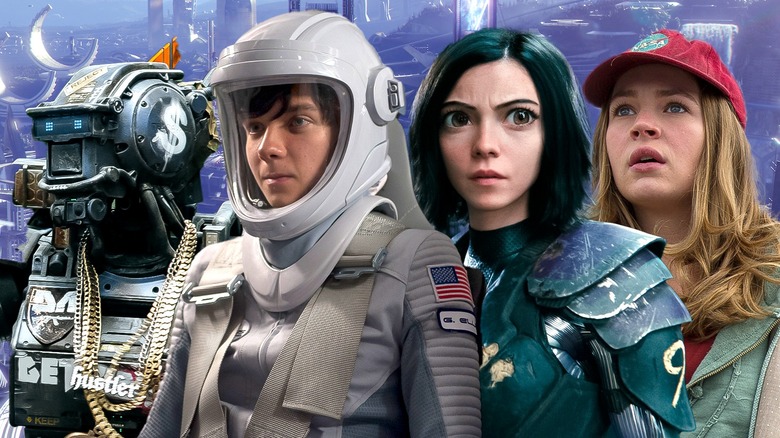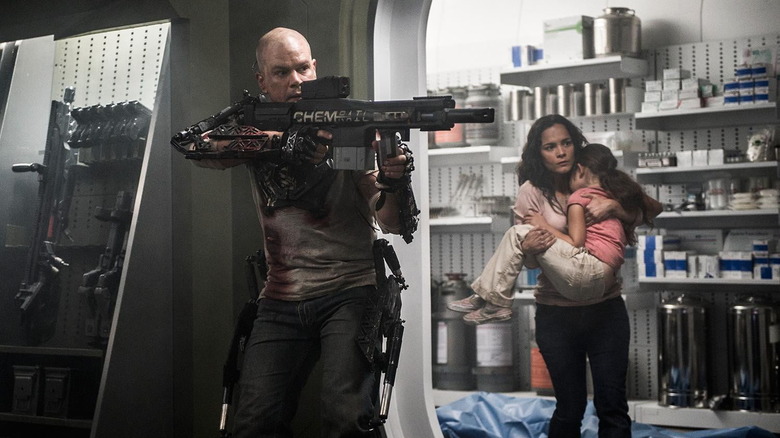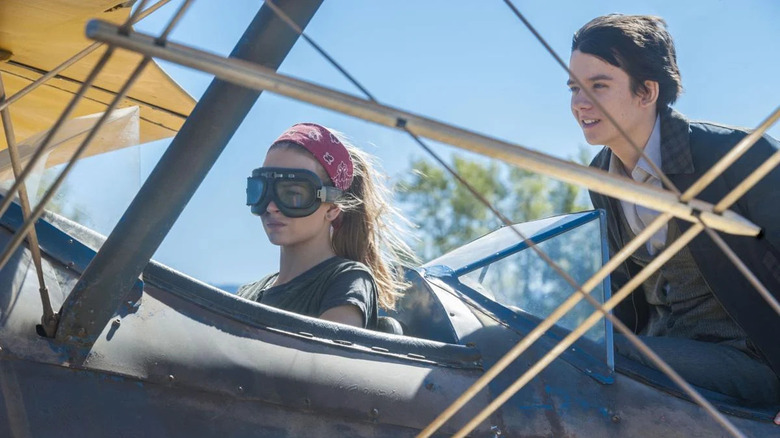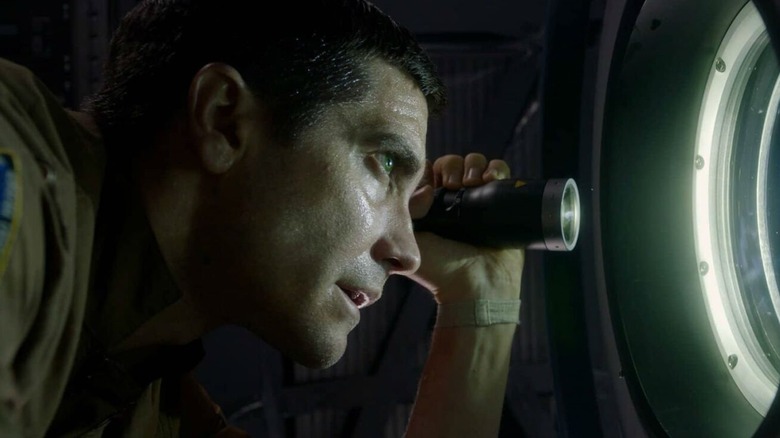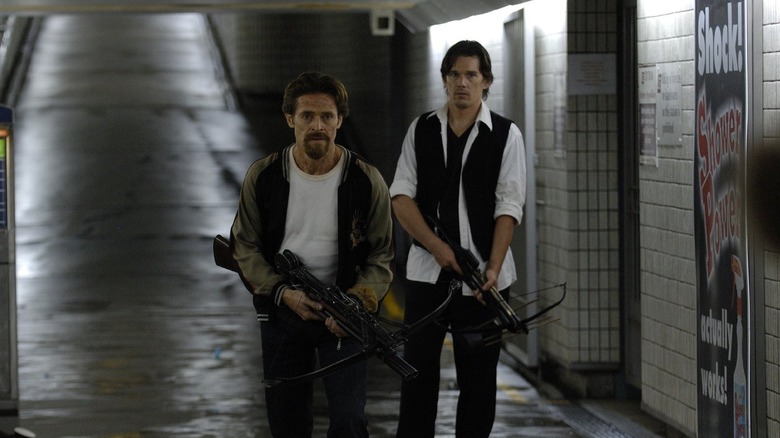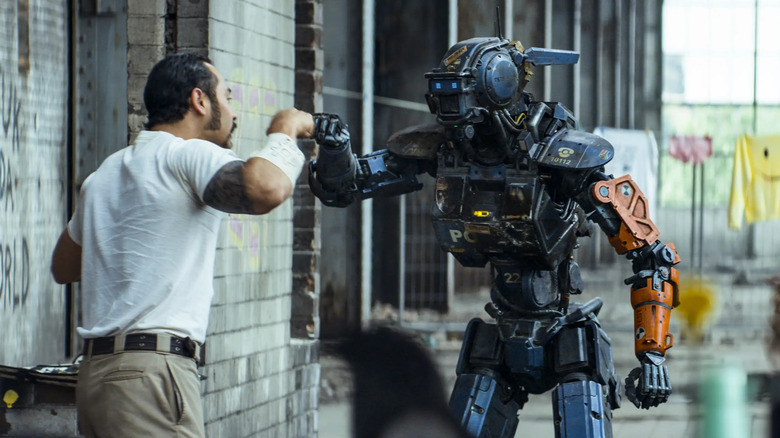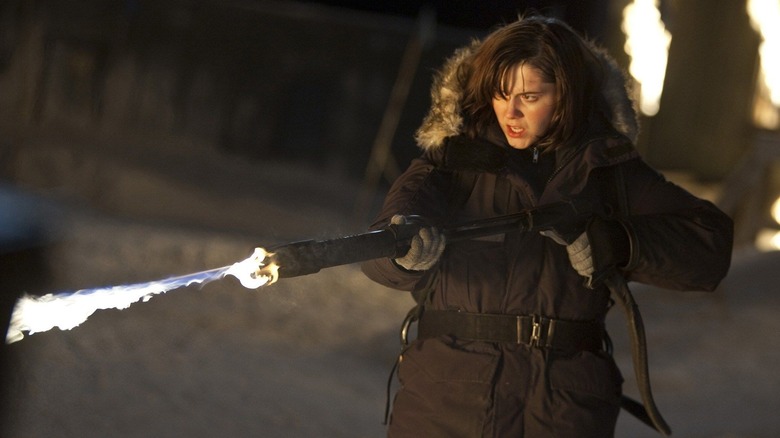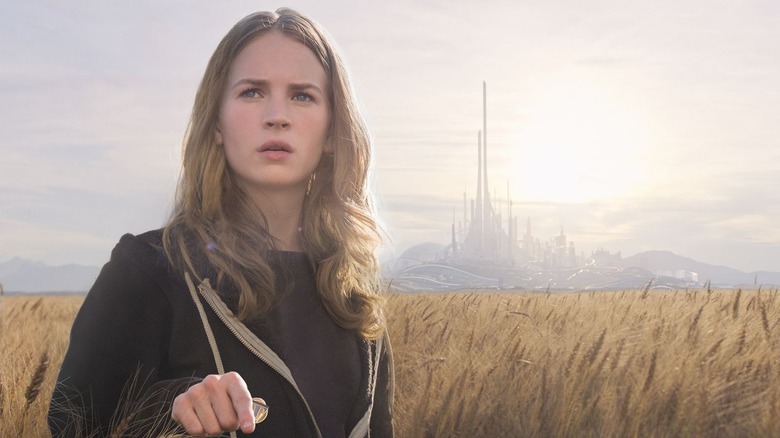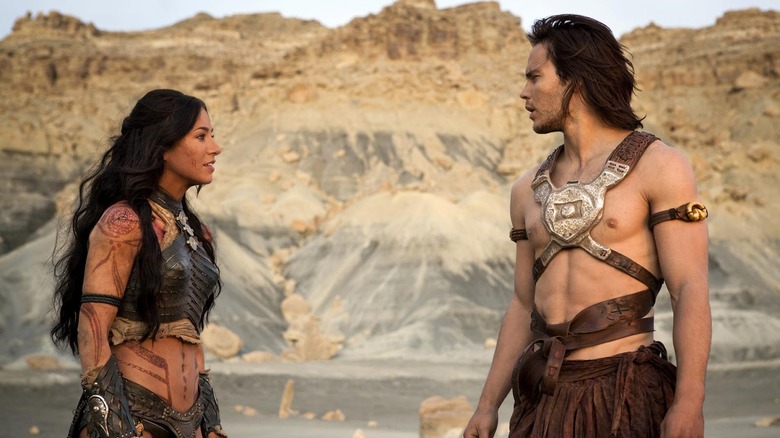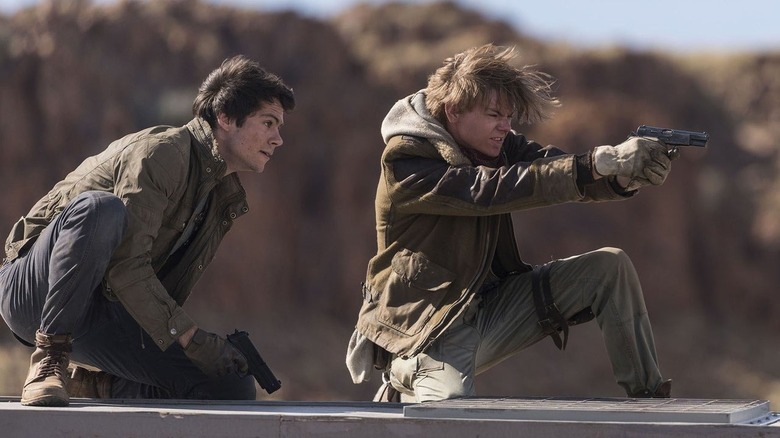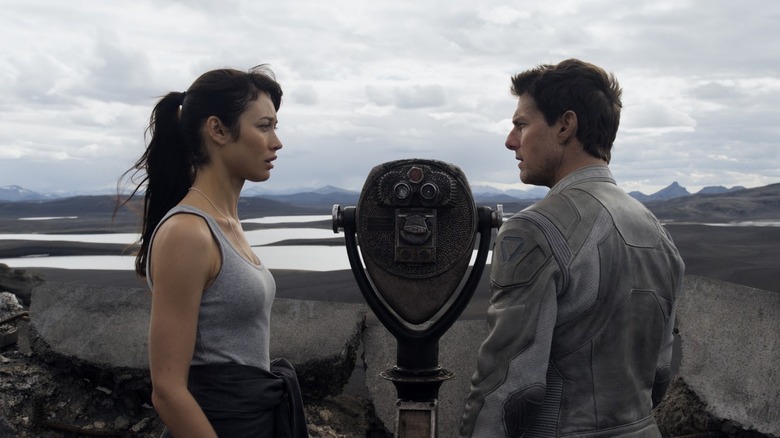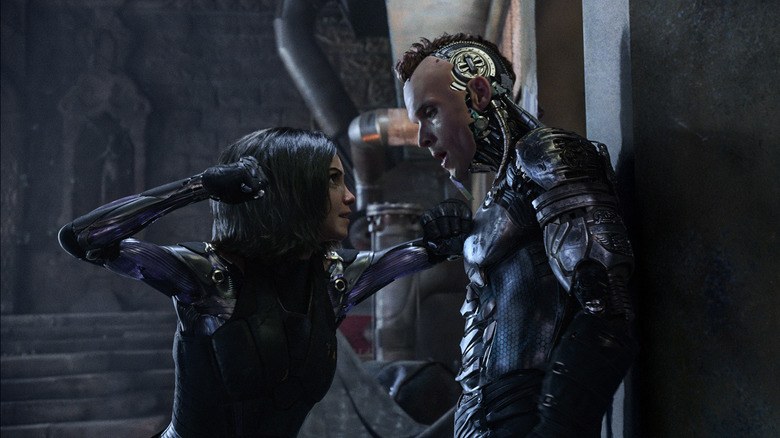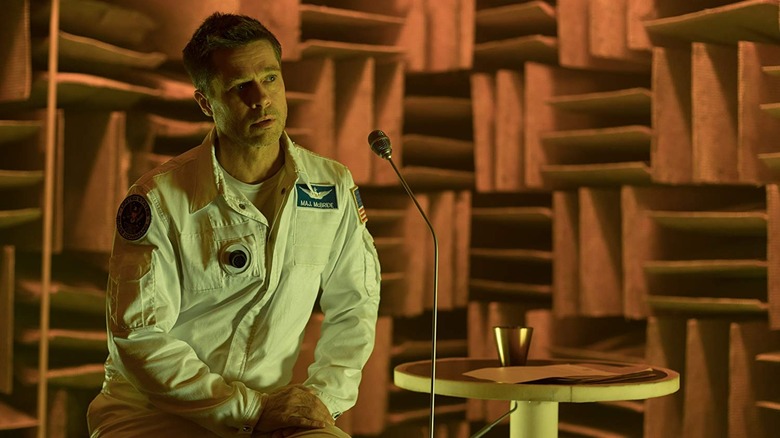Underrated Sci-Fi Films From The 2010s That Deserve Another Watch
Ever since the release of Georges Méliès' 1902 film, "A Trip to the Moon," science fiction has been a staple of cinema, and one of its most popular genres. While each decade has expanded upon the genre in its own unique ways and delivered hits that are watched and rewatched by many generations, it's hard to deny that the 2010s were especially great for sci-fi. Films like "Interstellar" made audiences question the nature of their reality, while others like "The Martian" showed the power of an isolated performance. Several sci-fi films in the 2010s, such as "Arrival" and "Gravity," were nominated for an Academy Award for best picture, and in 2017, "The Shape of Water" became the first science fiction film to ever win the coveted award.
But for every sci-fi picture that was released to great acclaim or impacted pop culture, several more were released and promptly forgotten. Often, there's a good reason for this, with many of those films being so underwhelming that they barely merit a watch. However, others ended up just being overlooked. Perhaps this was due to a bad marketing campaign, or being misunderstood at the time. That being said, many of these will still bring a lot of joy to dedicated sci-fi fans that might be looking to give these underrated science fiction films another watch, so here are some of the best ones from the 2010s.
Elysium (2013)
"Elysium" is the second film from South African filmmaker Neill Blomkamp. Blomkamp's first film, "District 9," was a surprisingly big hit amongst critics and audiences, and was even nominated for four Academy Awards. So naturally, there was a lot of excitement among viewers when "Elysium" was released in 2013. Unfortunately, the film failed to live up to expectations, and received lukewarm reviews that compared it unfavorably to "District 9."
While it's true that "Elysium" is not the masterpiece that "District 9" is, on its own, it's still a great film with some interesting social commentary and great effects. Much in the way that "District 9" tells a story about racism and bigotry through the lens of an interspecies conflict, "Elysium" deals with real-world issues of classism and immigration through a futuristic problem where Earth has become overpopulated and run down, and the rich live in an idyllic space station called Elysium.
Matt Damon stars in the film as a man living on Earth but trying to make his way to Elysium to receive medical treatment that could save his life. The questions and dissections on issues raised by the film, such as the right to healthcare, leave a lot for viewers to think about long after "Elysium" ends.
The Space Between Us (2017)
Released in 2017, "The Space Between Us" is a science fiction film starring "Ender's Game" and "Hugo" alum, Asa Butterfield, as the first child born on Mars, and tells the story of his first trip to Earth. While the film is definitely aimed toward teens, with more focus being put on the young hero's first romance than its science fiction elements, it still poses enough interesting sci-fi scenarios and interesting questions about what it would be like to be born off-planet to keep sci-fi fans interested. Butterfield plays Gardner Elliot, a 16-year-old who developed in the womb while his mother was in space and was born on Mars, a process that sadly ended in his mother's death during childbirth.
Because of this, Gardner was born with several health problems that made a trip back to Earth dangerous, and his only friend his age is an Earth girl named Tulsa (Britt Robertson) whom he meets online. Eventually, Gardner is given surgery that allows him to visit Earth and meet Tulsa, who he falls in love with, and search for his missing father. It's understandable why "The Space Between Us" received mediocre reviews when it was released, as it's filled with frustrating plot holes and irritating conveniences. But if you're willing to forgive some plot contrivances and a predictable twist, "The Space Between Us" is actually a really sweet story about family and young love with likable heroes that you can't help but root for.
Life (2017)
"Life" is one of the many science fiction films to attempt to replicate the success of Ridley Scott's "Alien," and while it may not be as innovative as the 1979 classic, it's a tense thriller that is far better than the mediocre reviews gave it credit for. Like "Alien," "Life" is a bottleneck horror-thriller that takes place on the International Space Station, which is manned by a six-person crew. The cast is small but each character is unique and likable, which includes Jake Gyllenhaal, Rebecca Ferguson, Hiroyuki Sanada, Ryan Reynolds, Ariyon Bakare, and Olga Dihovichnaya.
The plot revolves around the crew taking in a microscopic organism that is found on Mars (the first lifeform found outside of Earth), which they name Calvin. Unfortunately, Calvin begins to rapidly evolve when exposed to different elements and breaks free from its containment. It defaults to its survival instincts, which include going after the members of the crew, forcing them to not only fight for their lives but also ensure that Calvin never has the chance to make it back to Earth. While "Life" is a short film, its tight pacing keeps the tension alive at all times, and though it does utilize some predictable horror tropes in the second half, the terrific performances, excellent creature design, and well-executed finale make it a joy to watch.
Daybreakers (2010)
"Daybreakers" just barely makes this list, having released in theaters on January 8, 2010. Despite releasing during the transitionary time between the 2000s and the 2010s, it is very much representative of that several-year period in cinematic history where stories about vampires were all the craze, with many successful films about the mythological bloodsuckers being released in close proximity of each other. Some of these movies, such as "Twilight," "30 Days of Night" and "Let Me In" either opened to critical or financial success, but many others got lost in the mix. "Daybreakers" is one of those films, which is unfortunate, because it's actually pretty good.
The story takes place in a world where the majority of people have become vampires and require blood to survive. Ethan Hawke plays a vampire named Edward Dalton, a hematologist trying to develop a synthetic replacement for human blood since the world's population of humans has diminished. His path eventually crosses with a human named Elvis, played by Willem Dafoe, who claims he had once been a vampire but was cured, causing Edward to pivot his quest for synthetic blood into a search for a cure. It's an interesting premise elevated by impressive performances by Hawke and Dafoe, making it a fun watch for fans of vampire films.
Chappie (2015)
"Chappie" is the third film from Neill Blomkamp and much like his second film, "Elysium," "Chappie" went underappreciated when it was released in 2015. Much like Blomkamp's other two films, "Chappie" explores modern social issues through the lens of science fiction. Also like his other projects, "Chappie" tosses out the hi-tech utopias seen in many sci-fi films and replaces them with an alternative 2016 where the police force in Johannesburg, South Africa is replaced by robots called scouts.
The story's protagonist is the titular Chappie (Sharlto Copley), a scout droid uploaded with an AI that allows it to learn the way that a human child would. But when Chappie is kidnapped by a gang, Chappie's allegiances become torn between that of the gang and his creator, Deon (Dev Patel). Apart from the unfortunate inclusion of the rap duo, Die Antwoord, who have since become embroiled in controversy, "Chappie" has aged remarkably well.
The film poses questions regarding AI and the ethics behind experimentation with consciousness and also mirrors the ironic display of humanity seen in "District 9." While that film sees protagonist Wikus (Sharlto Copley) show more humanity as he becomes an extraterrestrial prawn, "Chappie" has its robotic protagonist display more humanity than the human characters around him, as he struggles with ethics and fights against his own looming death.
The Thing (2011)
John Carpenter's 1982 film, "The Thing," is often regarded as one of the best sci-fi movies of all time, and is regularly referenced as having some of the most interesting and complex practical creature effects, with various puppets and animatronics that still look incredible over 40 years later. Based on the novella, "Who Goes There?," "The Thing" wasn't the first film to adapt the story, with 1951's "The Thing From Another World" preceding it. However, it's such an iconic film that many believed it could never be done again, but that's exactly what the 2011 prequel tried to do.
2011's "The Thing" is somewhat of a unique entry on this list, as its inclusion also includes elements of not just what it was, but what it could have been. Instead of remaking the 1982 version, this film instead tries to tie into the Carpenter version by telling the untold story of the Norwegian research station that the titular Thing had decimated prior to the events of Carpenter's film.
While the movie boasts an interesting story and a great performance by its lead star, Mary Elizabeth Winstead, it's held back by ugly and cheap-looking CGI effects. It's since been revealed that this wasn't the original intention; "The Thing" was fully shot with terrific practical effects, and the studio later opted to replace them with CGI. It was an unfortunate decision that hurt an otherwise solid sci-fi horror film.
Tomorrowland (2015)
Before its release in 2015, "Tomorrowland" seemed like it had everything going for it. It was inspired by the beloved land of the same name at Disneyland, it was helmed by Brad Bird who had successfully directed films with Disney before such as "The Incredibles" and "Ratatouille," and it was co-written and produced by Damon Lindelof, a master of high concept projects such as "Lost" and "The Leftovers." Sadly, this didn't seem to matter, and the film ended up flopping at the box office and receiving mediocre reviews from both critics and viewers. The most surprising part is that "Tomorrowland" is actually really great.
The film tells the story of a secret city in another dimension, and how two characters come to find themselves entangled in the city's destiny, at different points in time, and their inevitable team-up to find their way back to the city of Tomorrowland. The film's tone hits the perfect balance of fun and lofty. One moment, the protagonists are being chased by androids with ray guns that harken back to the classic sci-fi B-movies from the '50s and '60s, while the next might feature a weighty and clever introspective into the destructive nature of humankind and the value of hope. It's the perfect sci-fi movie for both kids and adults and it's a shame it likely won't be seen by as many sci-fi fans as it deserves.
John Carter (2012)
Another sci-fi entry from Disney that flopped at the box office is "John Carter." The film is based on the 1912 novel, "A Princess of Mars," the first entry in Edgar Rice Burroughs' "Barsoom" series. The "Barsoom" books have long been considered one of the most important science fiction series, helping to inspire many popular novels and films that have come since. While Disney's film changes the name from "A Princess of Mars" to "John Carter," after its main protagonist, the movie is actually a surprisingly faithful adaptation of the novel, even down to including the strange narrative device in which the fictional John Carter is real life author Edgar Rice Burroughs' uncle.
The plot revolves around the titular character, who is mysteriously transported to Mars after accidentally activating a medallion belonging to a Thern. He quickly becomes embroiled in the political conflicts of Mars, locally called Barsoom. The film is a fun sci-fi action romp with solid effects and an interesting story, so it's sad that it never really took off with audiences. Some have blamed the unfocused marketing for the film's failure, and it, unfortunately, seemed to damage the career of star Taylor Kitsch, but it's nevertheless a good adaptation of one of the most important sci-fi novels ever written, and definitely worth a watch.
The Maze Runner: The Death Cure (2018)
Thanks to the success of "The Hunger Games" in 2008, the 2010s were filled to the brim with films based on young adult novels. Of particular popularity were sci-fi YA novels, often depicting dystopian futures where the fate of the world rests in the hands of a teen "chosen one." "The Maze Runner" is one such franchise, and while at first glance the series might not seem to have much to distinguish it from the droves of other sci-fi YA franchises, such as "Divergent," "The Maze Runner" trilogy is actually quite good. But what makes it especially unique among sci-fi YA franchises is that it manages to get better with each subsequent film. The first "Maze Runner" is a simple tale about a group of boys trying to escape a deadly maze, while the second film expands the universe and sets the survivors against zombies.
But it's the third film in the franchise, "The Death Cure," that really manages to impress. It elevates itself above its peers, both in its own franchise and out, in almost every way. The second film's twist ending, wherein one of the main protagonists joins the villains, provides an important perspective that makes all sides of the main conflict relatable and provides complex motivations for each character. In addition, the action sequences are surprisingly impressive, particularly the ones involving cars, which unfortunately led to actor Dylan O'Brien being severely injured in a stunt gone wrong.
Oblivion (2013)
"Oblivion" is an ambitious post-apocalyptic sci-fi film that was released in 2013, starring Tom Cruise as one of the only humans left on Earth after the planet is ravaged by an alien force. The film is terrific, but nearly a decade later, "Oblivion" seems to have mostly been forgotten. This may in part be due to the fact that Cruise's other big sci-fi film from the 2010s, "Edge of Tomorrow," released just one year later and was far more successful critically. But "Oblivion" is still a great flick in its own right, and it features a unique plot with unpredictable turns that fans of classic sci-fi are sure to love.
The story follows Jack Harper (Cruise), a drone technician who is one of the last two humans living on Earth. While most of humanity has left Earth and colonized the moon of Titan, Jack and his communications officer, Victoria (Olga Kurylenko), are on a mission to repair drones that were built to hunt the remaining scavenger aliens left on the planet. However, just as he is about to finish his mission and return to Titan, a ship crashes with a woman on it that Jack has seen in his dreams. The film's many mysteries keep it thought-provoking throughout, and the beautiful cinematography and effects will leave certain shots burned into viewers' minds long after "Oblivion" has ended.
Alita: Battle Angel (2019)
"Alita: Battle Angel" is a film based on a popular manga series called "Gunnm" by Japanese manga artist Yukito Kishiro. The film centers around a cyborg named Alita (Rosa Salazar), who is resuscitated by a scientist and bounty hunter named Dyson Ido (Christoph Waltz), who takes her in and treats her like a daughter. Alita sets out on a quest to recover her missing memories, all the while taking on other cyborgs as she works to defend Dyson from his enemies and becomes a rising star in the fictional sport of Motorball. She also meets a young scrap dealer named Hugo (Keean Johnson) whom she falls in love with.
While the plot can at times be a bit overcomplicated and convoluted, it doesn't stop "Alita: Battle Angel" from being an awesome, action-packed thrill ride that juggles its many stylistic influences surprisingly well. The film styles its many action sequences after those found in anime, and the visual design perfectly captures the cyberpunk aesthetic that fans of "Blade Runner" will be very familiar with.
Video game aficionados will also find a lot to like in "Alita: Battle Angel," as the movie seemingly takes several notes from the medium, particularly in how Alita moves from boss battle to boss battle in spectacular fashion. "Alita: Battle Angel" is also directed by Robert Rodriguez and co-written by James Cameron, which is definitely a winning combination.
Ad Astra (2019)
"Ad Astra" is one of the most ambitious science fiction films to have been released in the 2010s, and the fact that it isn't more often placed alongside films like "Interstellar" and "Arrival" as one of the best of the decade is truly depressing. Granted, when the film hit screens in 2019, it received solid reviews from critics, but audiences seemed less receptive.
"Ad Astra" takes place in the near future when a series of mysterious power surges have been affecting Earth and stars Brad Pitt as an astronaut named Roy McBride. After it is determined that the surges are liked to an old project started by Roy's father who has been missing for 30 years, Roy is told that he needs to go to Mars to try to establish contact with his old man.
One of "Ad Astra's" biggest strengths is its unpredictability. Roy is thrown between impressive set-pieces that harken back to many classic sci-fi ideas from the genre's storied history and the diversity in events and characters at times make the epic space opera feel somewhat limitless, which helps to display the vast and infinite possibilities of the space it explores. Pitt also gives an impressive performance that is understated and helps to lend to the often quiet and introspective nature of the film, which works in tandem with the incredible cinematography and effects.
